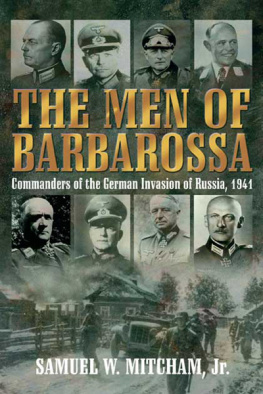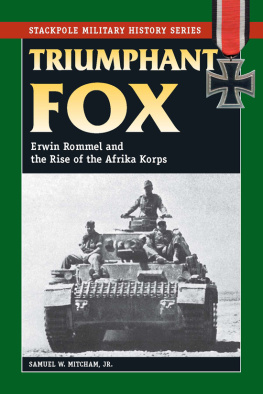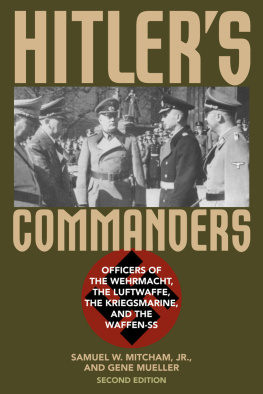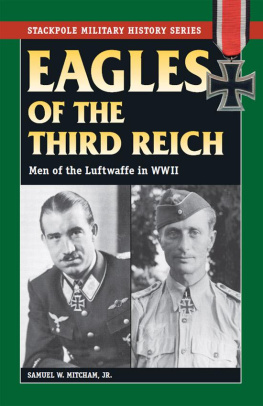HITLERS
COMMANDERS
Also by Samuel W. Mitcham, Jr.
Triumphant Fox: Erwin Rommel and the Rise of the Afrika Korps
Rommels Desert War: The Life and Death of the Afrika Korps
Rommels Last Battle: The Desert Fox and the Normandy Campaign
Hitlers Legions: The German Army Order of Battle, World War II
Men of the Luftwaffe
Hitlers Field Marshals and Their Battles
The Battle of Sicily, 1943
Eagles of the Third Reich
Also by Gene Mueller
The Forgotten Field Marshal: Wilhelm Keitel
When I was growing up in America in the 1950s, evaluating Hitlers commanders was all very simple: all Germans were Nazis, and all Nazis were evil. The higher in rank a Nazi rose, the lower he sank as a human being. A German general would, then, logically be a horrible human being. A typical Nazi (i.e., German) general would be brutal, absolutely regimented, totally insensitive to human suffering, and completely ignorant of anything outside the immediate sphere of his profession. Other than a certain amount of skill in military science (and an unsurpassed talent for destruction and disorganization), he had no redeeming qualities whatsoever. He undoubtedly ate with his hands, wiped his mouth on his coat, burped loudly, interrupted people anytime he felt like it, screamed, threw things, pitched fits, and was really happy only when he was launching unprovoked invasions of innocent countries. His favorite hobbies were mass murder, bombing undefended villages, and eating small babies for breakfast.
After I became an adult, the picture I perceived became much more complex. I was somewhat shocked to discover that not all Germans were Nazis and not all Nazis were German; furthermore, the men who came closest to doing away with Hitler (prior to 1945) were none other than German officers. Eventually my interest in military history led me to study the Wehrmacht in depth, and I discovered that there were all types of people in the German armed forces: heroes, cowards, Nazis, anti-Nazis, non-Nazis (as opposed to anti-Nazis), Christians, atheists, professionals, well-educated men, high school dropouts, backroom politicians, chameleons, innovators, dissenters, geniuses, the obtuse, men who looked to the future and men who lived mainly in the past. They came from many social classes, with varied backgrounds, varied educations, and varied levels of skill and intelligence. Also, they had many different types of careers and various kinds of luck.
The purpose of Hitlers Commanders is to describe the lives and careers of selected German officers from all three branches of the Wehrmacht, as well as from the Waffen-SS (armed SS). These officers were picked by Dr. Mueller and me on the basis of the diversity of their characters and careers, the availability of information, and our own interests. Some readers may take issue with certain of these selections, but, since there were 3,663 general officers in the German Army alone during World War II, it is natural that our selections should differ from those of others; in fact, it would be quite remarkable if any author or sets of authors would choose exactly the same cast of characters we selected.
One aspect of this book that warrants mention is the relative lack of field marshals covered here. This is because my book Hitlers Field Marshals and Their Battles was just published in the United States in 1990, and I thought it inappropriate to cover them again here. We made five exceptions: Wilhelm Keitel, Ritter Wilhelm von Leeb, Georg von Kuechler, Fedor von Bock, and Friedrich Paulus. Keitel is included because Dr. Mueller knew his family and wrote a book on his life many years ago. Paulus is here because in a chapter on the generals of Stalingrad it would be impossible to leave him out. The remaining threeLeeb, Kuechler, and Bockare discussed in the chapter on the commanders of the Eastern Front because they represented three different types of generals. Leeb was a moral, Christian, anti-Nazi, straitlaced Bavarian general of the old school, who had no use for Hitler or his party. Bock cannot be labeled pro-Nazi, non-Nazi, or anti-Nazi; he can only be described as pro-Bock. Kuechler fell somewhere in between. Even so, the treatment of these three is considerably different from that in Hitlers Field Marshals. There the emphasis was on their battles; here it is on their personalities and characters.
Dr. Mueller and I would like to express our appreciation to a number of people for their assistance in the completion of this work. First, we would like to thank our wives, Donna Mitcham and Kay Mueller, for their long-suffering patience and assistance in proofreading. Thanks also go to Paula Leming, professor of foreign languages, for help in translating; to Colonel Jack Angolia, Anthony Johnson, Thomas Smith and Dr. Waldo Dalstead for the loan of certain photographs; to Valerie Newborn and the staffs of Huie Library, Henderson State University, and Henderson Library, for their assistance in acquiring interlibrary loans; and to the staffs of the National Archives, the Library of Congress, the Army War College, the Defense Audiovisual Agency, the Air University, and the Bundesarchiv for their help in securing documents and photos used in this book. Also, thanks go to Colonel Edmond D. Marino for his invaluable advice.
Samuel W. Mitcham, Jr.
MAP 1

MAP 2

EASTERN EUROPE, 1941
MAP 3

THE GENERALS
OF THE HIGH COMMAND
Wilhelm Keitel. Bodewin Keitel. Alfred Jodl. Ferdinand Jodl.
Bernard Lossberg. Georg Thomas.
Walter Buhle. Wilhelm Burgdorf. Hermann Reinecke.
WILHELM KEITEL was born on the family estate of Helmscherode in western Brunswick on September 22, 1882. Although he longed to be a farmer, as his ancestors were, the modest 650-acre estate was too small to support two families. Consequently, Keitel joined the 46th Field Artillery Regiment in Wolfenbuettler as a Fahnenjunker (officer-cadet) in 1901. The desire to return to Helmscherode, however, remained with him throughout his life.
Keitel was commissioned second lieutenant on August 18, 1902, entered an instructors course in the Field Artillery School at Juterbog in 1905, and in 1908 became regimental adjutant. He was promoted to first lieutenant in 1910 and to captain in 1914. (See for a table of equivalent ranks.)











